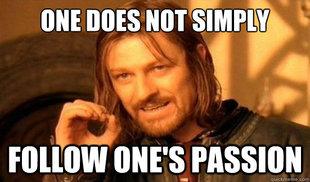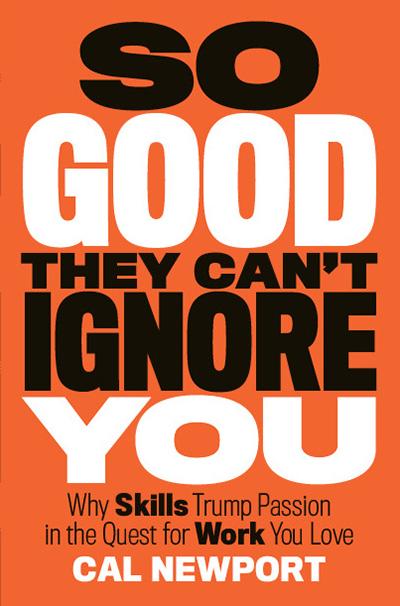
We all know that famous Steve Jobs speech from Stanford – the one where everyone seized on the palatable, soundbitable angle: Love your work. Don’t settle.
As Cal Newport writes in the early pages of his book So Good They Can’t Ignore You, our generation is rather obsessed with ‘following our passions’. But ironically, that’s not at all what Jobs actually did. Had he done that, Newport says, Jobs would probably have wound up as a teacher at the Los Altos Zen Center. Apple was the result of a lucky break, a small-time scheme that took off, albeit one that Jobs no doubt eventually became passionate about later.
What’s actually more important and more telling about that Stanford speech is what Jobs says about joining the dots in retrospect:
“You can’t connect the dots looking forward; you can only connect them looking backwards. So you have to trust that the dots will somehow connect in your future.”
Having just finished the book, I’ve got a few thoughts to put into words. Bear with me!

The dark side of the ‘passion’ mindset
Chasing passion is often unrealistic and in many cases only leads to disappointment. Newport cites a few studies to back up this argument:
One surveyed a group of students and found the vast majority did not have passions that mapped to work/career paths - most were instead related to leisure or hobbies.
Another found that among employees who all held the same administrative role with nearly identical duties, there was a fairly even split between those who saw their work as a job vs those who saw it as a career or even a calling – and those most likely to think of it as a calling were the ones with the most years on the job.
And yet another found that job satisfaction numbers have been trending downwards over time. “The more we focused on loving what we do, the less we ended up loving it,” he writes.
Give, and you shall receive?
What I took away from the book is that mastering your craft – which we should all aspire to – is its own kind of reward. Get so good that people can’t ignore you and will pay you accordingly … and job satisfaction follows.
It’s the same philosophy Newport has outlined on his blog; the book is his attempt to flesh this out with living examples and further depth.
It’s a pragmatic approach that no doubt most of us know deep down holds a lot of truth:
Focus on what you can offer the world, instead of what the world can offer you.
Derek Sivers, ostensibly a guy of many passions who’s done a bunch of different things, is one of the ‘masters’ in the book and is quoted thusly: “I have this principle about money that overrides my other life rules: Do what people are willing to pay for.”
The law of financial viability, then, is one to bear in mind. I’ll never forget a conversation that went down in our dorm room in Grindelwald, Switzerland. Four of us were sitting around talking: me, T, a ditzy girl from Connecticut and an intense Southern guy who traveled all over the world organising and running races (marathons and ultras). We were discusing how he managed to scrape together a living doing this (he definitely wasn’t doing it for the money) and inevitably, the “passion” word came up.
“So, do what you love and the money will follow?” Ditzy Girl piped up eagerly, obviously waiting for a high five and rah-rah chirpy confirmation.
But rather than immediately jumping to affirm this, Running Guy paused.
“More like, do what you love and figure out a way to make money from it,” he said seriously.
The missing piece of the puzzle
The biggest thing I felt was missing from So Good They Can’t Ignore You was that vital first step. What do you do if you have NO idea what you want to do? (This is the ongoing problem in our household, specifically on T’s side.) How do you get started? Do you just try to get a foot in the door somewhere, assuming the basic elements are bearable – that there’s some room to grow, you don’t actively hate the industry, and you don’t hate the people – and stick with it, beavering away on the quest to achieve mastery and become a highly valuable professional?
One of Newport’s examples, Pardis Sabeti, touches on this: “I think you do need passion to be happy. It’s just that we don’t know what that passion is. If you ask someone, they’ll tell you what they think they’re passionate about, but they probably have it wrong.” From that, Newport concludes that it’s a “fool’s errand” to try figure out in advance what work will lead to that passion. Alas, that point isn’t taken any further.
Yes, he demonstrates that many of his example ‘masters’ took awhile to find their exact direction, but they generally started down the right sort of track early on; it was just a matter of honing in from there over time. It’s not super clear how they found that track to start with. Newport does acknowledge at one point that it’s very hard to start from the bottom in a new field, so if you’re genuinely floundering, maybe the key is simply finding a field that you can tolerably devote yourself to.
Finally, I don’t think that the ‘craftsman’ approach and the ‘passion’ approach are mutually exclusive. They can actually play in quite well together, which I don’t think Newport adequately acknowledges. Passion, or at least interest, was definitely an element for many – though not ALL – of the examples of happy ‘masters’ cited in the book. Take the screenwriter, the archaeologist, the geneticist. One does not complete a master’s/PhD without at least some interest in their subject! In an effort to draw clear lines and take a strong, controversial stance that sells books, passion gets thrown totally under the truck.
In closing: If you read his blog Study Hacks, you probably won’t glean much more meat from the book. He also gives a good overview in this 99U talk.
Cal Newport: “Follow Your Passion” Is Bad Advice from 99U on Vimeo.
